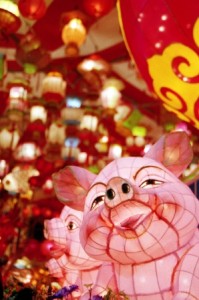Once again Valencia Town Hall Council is collaborating in the celebration of the Chinese new year, the year of the rat as Al Stewart didn’t quite sing.
The celebrations usually take place in Valencia’s own Chinatown, around Calle Pelayo, without the presence of Jack Nicholson, or his nose, where many Chinese businesses flourish.
On Saturday 25th January at about 6.30 pm the Chinese dragon will run around the streets and fireworks, which are at the heart of the Valencian Chinese connection, along with citrus fruits, remind those of us with a historical bent, that Valencia used to be on the silk route which brought Chinese produce to Europe in medieval times.
The parade will end up in the Plaza del Ayuntamiento for some fireworks.
The Chinese new year, following the lunar calendar, begins on January 25th in 2020.
Chinese months begin on the darkest night of moonlight and continue until the day when the moon is brightest.
Confucius (551 BC- 479 BC) is a frequently quoted man, who has had more effect on Chinese thinking than even Mao Tse Tung’s little red book. Among other wise sayings, he is believed to have said: “When anger arises, think of the consequences”. “Life is really simple, but men insist on making it complicated”. “Before you embark on a journey of revenge, dig two graves.” “It does not matter how slow you go so long as you do not stop.” “Study the past as if you would define the future.” “Forget injuries, never forget kindnesses.” “The only constant is change.”
Confucius’s philosophy emphasized personal and governmental morality, correctness of social relationships and justice and sincerity; for Confucius, choices were to be based on benevolence, ritual, reciprocity and filial piety.
When he wasn’t pondering the philosophy that was to dominate the most populated country in the world for many centuries, Confucius worked as a shepherd, cowherd, clerk and book-keeper. He described himself as a “transmitter who invented nothing”, emphasised the importance of study, and urged his disciples to think for themselves and to study the outside world.
It is no wonder then, human philosophy not having progressed much since, that Confucius is still revered today in China and throughout the world. So much so that the Chinese government’s language and cultural institution abroad, the equivalent of the British Council, Cervantes Institute or CIA, is called the Confucius Institute.
One of them is located in the University of Valencia, in the Faculty of Philology, Translation and Communication in Avenida Blasco Ibañez 32.
But the Confucius Institute aims to be much more than a language academy; it also aims to bring Chinese culture closer to Valencia with a range of activities including cinema, theatre, exhibitions, collaborations with museums, Tai Chi, medicine and calligraphy classes, and even Chinese cookery.
Central to the philosophy of the Centre is the idea that China is in a process of profound change and that it is important to be able to understand those changes, whether through receiving classes from the 10 teachers there or by joining in the celebrations organised for the Chinese new year each February.
Among the native teachers in the centre is Lin Shutian, sent by the Chinese government to help set up the Institute along with a donation of 5,000 textbooks. About 70% of the students belong to the University, the other 30% being outsiders attracted by the possibility of studying in a well-organised and professionally prepared environment with clear aims and objectives.
UV students can also earn credits as the courses are validated by the University for degree courses.
Although UV has had a relationship with China for more than 20 years, including a EU sponsored Ceop-Aegis research programme concerning water in Tibet led by UV teacher José Antonio Sobrino, the ball really started rolling in 2005, when Vicente Andreu was invited to a congress in China, where a newly designed programme for teaching Chinese to foreigners was presented. Determined to be among the first to give it a try, UV attracted 120 students in the first term alone, demonstrating that although English is not yet a dead language (Lin Shutian himself speaks it) there is a growing interest in Chinese among Valencian students, teachers and businessmen and women.
The Institute also collaborates with other faculties in incorporating elements of Chinese culture into other subjects such as history or economics.
UV also has a students and teacher exchange programme with some Chinese Universities.


